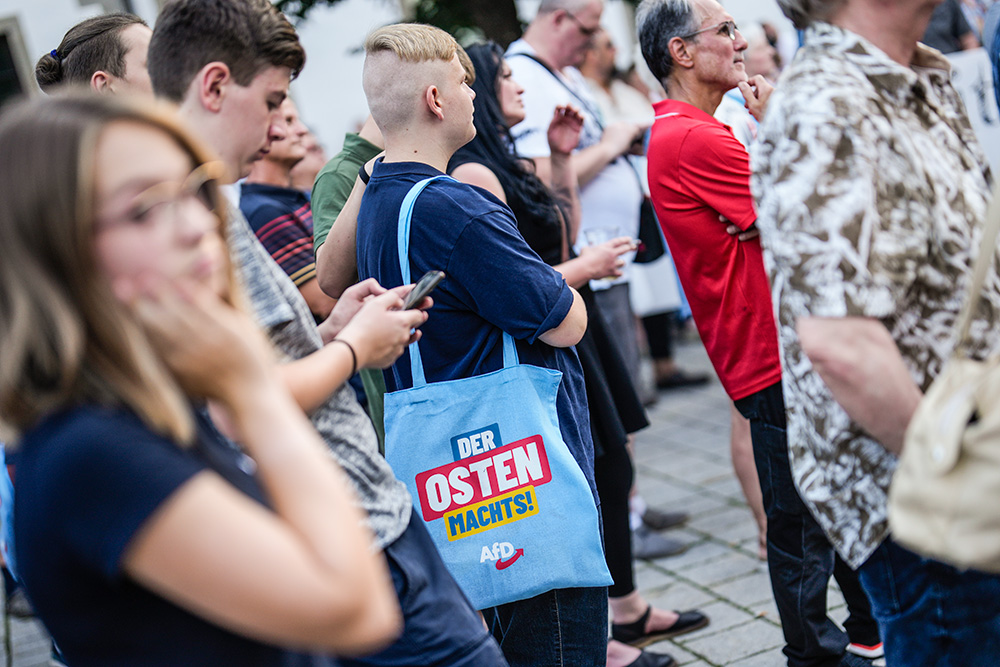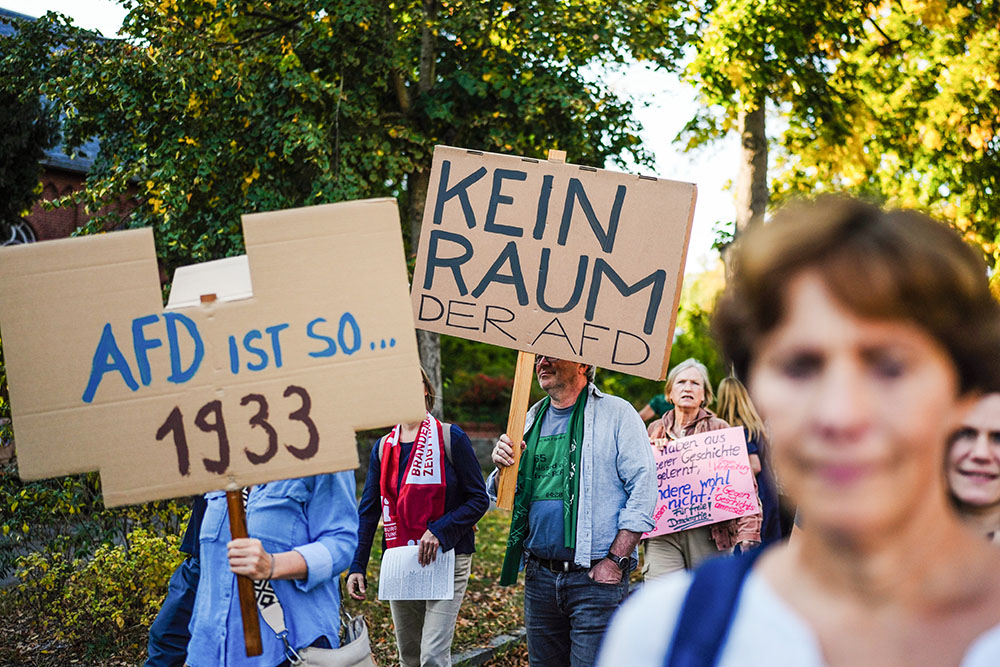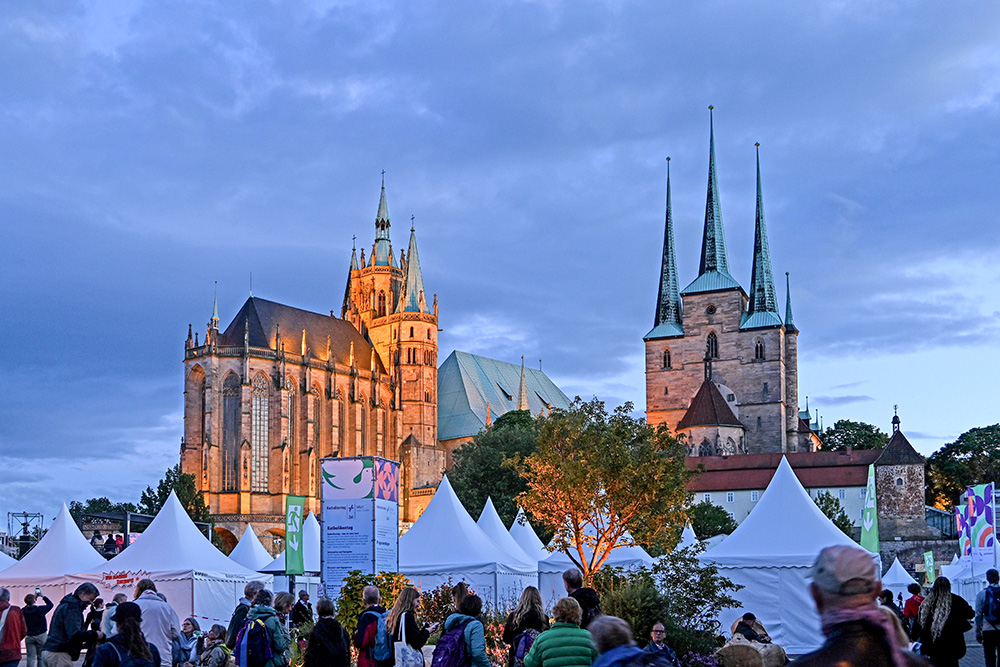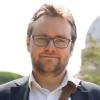
A young man with an AfD bag reading, "The East does it," attends a campaign rally of the far-right Alternative for Germany party in Suhl in the German state of Thuringia Aug. 13. (AP/Markus Schreiber)
Eighty years after World War II, right-wing politics are on the rise again in Europe.
Many in Germany are alarmed about the surge of the extremist Alternative for Germany party. Like other right-wing parties in Europe, they deny the effects of climate change and call for the deportation of people with foreign roots. The federal office for the protection of the German constitution has officially classified the party as a possible threat to democracy.
Yet in recent state elections, the party won about 30% of the votes. This is a tense situation for the whole country — even Catholic Church officials are abandoning their traditional nonpolitical stance to join in the fight against populism and extremism.
Usually, the German states of Thuringia and Saxony do not make international headlines but this changed on Sept. 1. In both regions, almost one-third of voters gave their vote to the Alternative for Germany party, known as AfD.
Established in 2013, the party has put its mark on society for the past decade. As in other European countries like Italy, France and Poland, right-wing politics in Germany has been on the rise since the beginning of Europe's refugee crisis in 2015. That year, more than a million people, mostly from Syria, fled to Germany. Back then, Christian conservative Chancellor Angela Merkel opened Germany's borders. She assured the 80 million Germans that their country would be able to handle the new load, saying: "Wir schaffen das!" ("We can do it!")
Advertisement
Almost a decade later, the situation has gotten tense. Not only are some refugees struggling to integrate into German society, but a recent deadly Islamist-motivated knife attack in the city of Solingen has stirred anti-immigrant sentiment all over the country.
Especially affected by this are the states of former East Germany. Even though fewer migrants live in the former socialist part of the country, resentment is on the rise, due to a lesser standard of living more than 30 years after the country's reunification in 1990.
All of this led to a narrow win for AfD in the Thuringia state elections on Sept. 1 and narrow losses in the states of Saxony and Brandenburg. In all three states, the party won about 30% of the vote.
As it looks now, in early October, the party will not be part of any state government, as all the other parties along the political spectrum are refusing to cooperate with AfD.
'Right-wing extremist parties and those on the fringes of this ideology can not be a place of political activity for Christians,' the German bishops said.
With AfD on the rise, voices warning of electing nationalists have gotten louder. Warnings come from politics, society, and the Catholic Church as well, which is quite unusual, as the German church hasn't gotten involved in party politics for decades. In the second half of the 20th century it was not uncommon for parish priests to call on their flock to vote for the Christian Democratic Union, Angela Merkel's party. This has fallen out of fashion in recent decades though, at least until 2024.
In February, in an unprecedented step, the German bishops' conference called AfD "unelectable" for Christians. Ethnically motivated nationalism should be incompatible with the Christian image of God and man, the bishops' statement said.
"Right-wing extremist parties and those on the fringes of this ideology can not be a place of political activity for Christians," the bishops insisted.
After the recent state elections, their words got even more direct. "I have to warn against voting for AfD," the head of the conference, Limburg Bishop Georg Bätzing, said at the annual St. Michael's Reception in Berlin on Sept. 10.

In Potsdam, Germany, Sept. 22, protesters hold placards reading "AFD is so 1933" and " No space for AFD" during a demonstration near the location of Alternative for Germany's election party in the German state of Brandenburg. (AP/Markus Schreiber)
Did the bishops' earlier warning have any influence on the recent elections? It is hard to say. But interestingly, election maps show one clear distinction. AfD won most areas of Thuringia, except for the traditionally Catholic Eichsfeld region in the northwest. In a state with mostly religiously unaffiliated voters (after 40 years of antireligious socialism), this is the only region not going for AfD. The difference is marginal, with only a few percent less for the right-wing party and does not qualify for any definitive conclusions. Yet the coincidence is remarkable.
It's not only the bishops' warning against AfD, though. German lay Catholics have published strongly worded statements as well.
The laypeople in Germany are organized under the Central Committee of German Catholics, most known internationally for heading the "Synodal Path" reform project together with the bishops. The Central Committee of German Catholics is the head organization of most of Germany's Catholic lay groups, such as Scouts or Catholic women's groups.
Many prominent Catholics are members of the committee. They also warn against AfD. "We are convinced that the positions promoted by the AfD do not go in line with our principles," Marc Frings, secretary general of the committee, said in a statement to NCR.

People gather for Katholikentag May 30 in Cathedral Square in Erfurt, Thuringia, Germany. (Wikimedia Commons/Thomas Hummel)
One of the committee's most important jobs is to organize "Katholikentag," Catholic Day, which is held every two years in a different city, calling tens of thousands of Catholics to participate in prayer and celebrations, but also in political discussions. This year, Katholikentag was held in Erfurt, the capital city of Thuringia, just a few weeks before the state's elections. Even though Katholikentag is a highly political event, no speaker of the AfD party was invited.
"Groups and individuals with radical positions that contradict our Christian values are not invited as speakers," said Frings.
The committee is going so far as to lobby for a federal ban on AfD as a political party, a move that hasn't been initiated but has been discussed for years now. It seems many institutions are still figuring out how to handle Germany's new political landscape.
However, at the 2018 Katholikentag in Münster, the committee did invite an AfD speaker to one of the panels. Ahead of the European elections, the committee held a workshop with the speakers for religious affairs of all the parties present in the Bundestag, the German parliament, which included AfD.
Frings now regrets this action, telling NCR: "This was an exception, and I can confirm that we do not intend to reach out to this party again."
The future will show if all of these statements and actions by Catholic officials will play a role for German voters. The rude awakening might come next fall, when the nationwide Bundestag elections will be looking for a new German government. Latest polls see AfD in second place, but with a volatile political climate in Germany, it's almost impossible to make any predictions right now.






